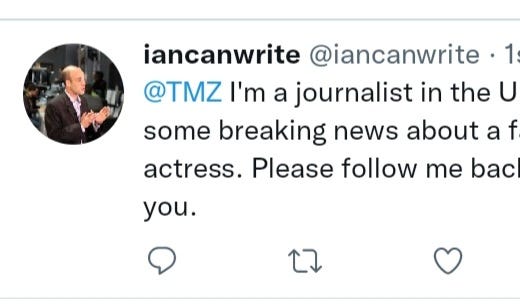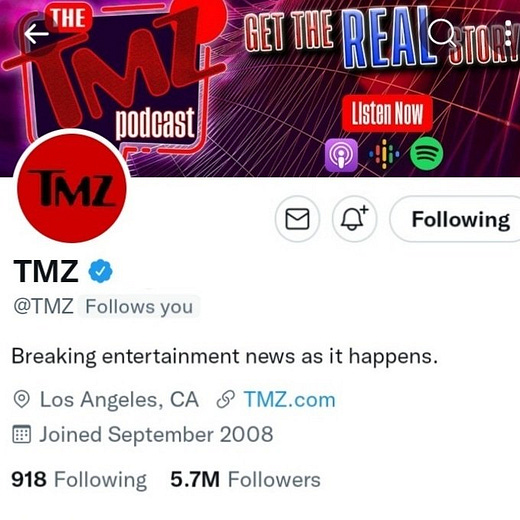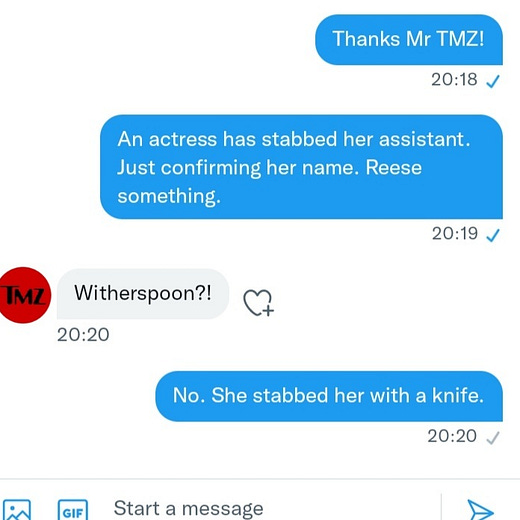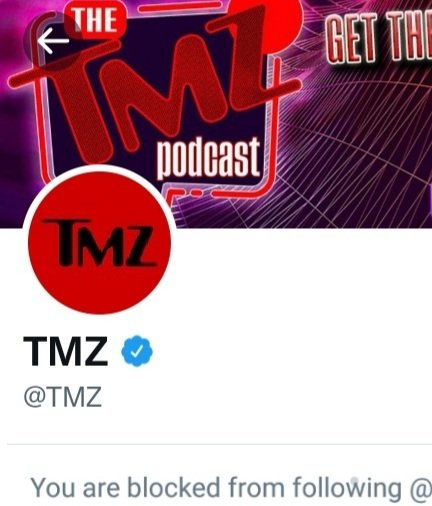How does TMZ work?
Launched in 2005, TMZ's internet-native model upended media.
Thanks for subscribing to SatPost.
Today, we’re breaking down celebrity news site TMZ.
Also this week:
Why are people hating on Airbnb?
The business of newsletters
And some dumbs memes (including a very good Twitter reply)
“Warriors’ Draymond Green and Jordan Poole Involved in Altercation”.
That was the headline I read on October 5th.
For the non-American sports viewers, Green and Poole are key contributors for the NBA Champion Golden State Warriors.
The headline sounded bad but not that bad…until grainy video footage of Green unleashing a haymaker on Poole was leaked to the internet (side note: the last place you ever want to see your name is in a news headline with the words “grainy”, “leaked” and “video”).
The footage — which happened in a closed-door practice — put the Warriors’ organization on the defensive and may have irreparably damaged Green’s relationship with his teammates. It’s one thing to deal with internal beef among a handful of players, but the pressures magnifies when millions of people see the transgression.
While we don’t know who leaked the video, we all know who put it on the internet: TMZ. Launched in 2005, TMZ has long been the #1 source for breaking news on the celebrity and entertainment industrial complex. Its name is even a direct hat-tip to the industry it covers: “Thirty Mile Zone” (TMZ) is a geographic area in LA that historically housed many leading TV and film studios.
Don’t let the celebrity aspect of TMZ fool you, though. The site does real news reporting and is a great case study for understanding how internet-first operations topple legacy gatekeepers — in this case, publicists that ran Hollywood media.
To understand the TMZ playbook, we have to understand its founder Harvey Levin. Born in 1950, Levin is a former lawyer and law school teacher who transitioned into media. Levin started as a legal analyst for a local LA NBC channel in the 1980s before pursuing bigger TV opportunities that dealt with law and entertainment: he co-produced and did on-air work for The People’s Court (mid-1990s) and created Celebrity Justice (early 2000s).
Levin found his ultimate success with TMZ, launching the website in 2005 with backing from Warner Bros. and AOL (he launched a TMZ TV show in 2007, which you’ve probably seen).
Last November, Fox bought TMZ for $50m. Based on the few financials I could find — and an estimated acquisition multiple of 2-3x sales — I’m guessing TMZ’s (mostly ad) revenue is $15m-$25m a year. If $50m feels low, just remember how many web-based media brands of that vintage (Buzzfeed, Vice) have struggled in the age of social media eating attention. Also, TMZ content isn’t exactly brand friendly for a lot of big ad spenders.
That low-ish valuation also belies the fact that TMZ completely changed the media game. It’s internet-native model has long been copied and its first-mover advantage didn’t guarantee success. But TMZ is worth studying and we will do so by revisiting 3 of the most famous stories that the site broke:
Breaking down the gatekeepers (“The Mel Gibson tirade”)
Vetting tips with hard sources (“Jay-Z and Beyonce in the elevator”)
An internet-native operation (“Michael Jackson dies”)
Pulling back the curtain (“The Mel Gibson tirade”)
In 2006, actor and director Mel Gibson was arrested in LA for drunk driving. He went on a wild rant that included many anti-Semitic remarks.
TMZ received a tip on the story that contradicted the official police statement that Gibson was arrested “without incident”. This is where the combination of Levin’s lawyerly and reporter instincts kicked in: he had his TMZ team of 20 pursue the story and they eventually found that court documents had been doctored to protect Gibson.
The site published an article titled “Gibson’s Anti-Semitic Tirade: Alleged Cover Up” and it became TMZ’s first huge scoop. As detailed by Buzzfeed, Levin’s motivation for pursuing the story was because there was a cover-up:
According to several of his staffers at the time, Levin was driven to tirelessly pursue these scoops by a desire to dismantle the unspoken but elaborate system that exempted the high-powered and beautiful of Hollywood from the rules to which the rest of the world were held. Levin had spent nearly 30 years observing the system — cops, judges, prosecutors, juries — allow the beautiful, wealthy, and powerful to misbehave, sometimes with total impunity.
Pre-TMZ, Gibsons’s publicist team would likely have been able to sweep the story under the rug. Not anymore. In the years that followed, TMZ would break media-related stories that pulled back the veneer on the celebrity world.
Vetting tips with hard sources (“Jay-Z and Beyonce in the elevator”)
When the Draymond Green tape came out, everyone wanted to know: “how much did the video leaker get paid?”
While antithetical to traditional journalism, Levin has said he’s happy to pay for hard evidence but that he won’t pay a lot because TMZ still needs to spend resources verifying everything (of course, he’d want to talk down how much he spends). A 2016 New Yorker article collected some unofficial payment prices:
$5k for a video of Drake dropping a stack of cash outside a nightclub
$80k for a photo of a check Charlie Sheen gave to an escort
$105k for a two videos of NFL player Ray Rice punching his wife in an elevator
$250k for surveillance footage of Beyonce’s sister Solange hitting Jay-Z in an elevator (another source said the payment was only $5k, which seems too low).
The price paid for evidence is probably a combination of: 1) degree of celebrity; 2) scandal-potential of incident (standard media heuristics apply: “if it bleeds it leads” and “sex sells”); and 3) straight up negotiation skills.
As a way to illustrate the third point, here are two other big TMZ scoops and how they were obtained:
Justin Bieber makes a racist joke: The same New Yorker article talks about TMZ receiving tip of Bieber making a racist joke while ad-libbing one of his songs. The source asked for $80k. A TMZ employee “was sent to Levin’s house” and given $80k in an envelope. Said employee then drove to an apartment outside of LA and handed $80k to someone in exchange for a laptop with the video.
Michael Richards racist tirade: Per Buzzfeed, “The source wanted several thousand dollars for the tape, and TMZ would pay it, but the source wanted the cash immediately — as in before-the-banks-opened immediately. Levin couldn’t write a personal check and allow the money to be traced back to him, and he, like everyone else, had a limit on the amount of cash he could take out in a single day from the ATM. His solution, according to multiple staffers working for the site at the time: Call every TMZ staffer and force them to immediately take out their ATM max and bring it down to the TMZ offices.”
Based on these precedents, it’s likely that the Green tape sold for more than $100k. But the more important takeaway here is TMZ’s desire for hard evidence.
TMZ receives over a 100 tips a day. A network of sources — including hotel doormen, limo drivers and airline attendants — pass information on celebrity gossip and movements (that’s how we get those ubiquitous “celebrity coming out of the airport interviews”). There are countless leads from everyday professionals in possession of something damning (one very controversial example: a number of LAPD officers were investigated for leaking photos of Rihanna after she was assaulted by Chris Brown).
Historically, Levin has also had at least 3 full-time employees posted at the LA courthouse.
Once owned by Time Warner — and now Fox — TMZ is hated by a lot of people and always at risk of getting sued to oblivion. So, it’s very important for the TMZ operation to get hard evidence (video, photos, legal documents) before publishing a story.
Solo celebrity blogs (eg. Perez Hilton) active in the mid-2000s happily trafficked on un-substantiated rumours while a famous tabloid (eg. National Enquirer) would publish a claim based off a lie detector test.
This isn’t to say that TMZ always gets it right (here are some big mess-ups). But the news reporting process has more rigor than you might expect for its reputation. (side note: the TMZ job sounds brutal; 12-15 hour work days chasing breaking news in a hot house work environment with a boss that goes very very hard — Levin is apparently up at 3:30am every morning and regularly goes off on people).
An internet-native operation (“Michael Jackson dies”)
In a 2013 lecture at the University of Chicago, Levin explained the rationale behind launching TMZ:
“[In 2005] I was thinking ‘what would make a website successful?’ My problem [in TV] was time periods. I had all these great stories and we had this great news operation. But we couldn’t make a business out of it because we were saddled by these terrible time periods."
“If we can get things right [with the rigor of news operation], we’re not going to be saddled by time periods…[or] publishing cycles like a newspaper or magazine. When you get it right, you just get it up. How can you not win that? There’s a huge void [on the internet].”
Think back to 2005: Facebook had only been around for a year and Twitter wouldn’t launch until 2006. By going internet-first, TMZ did fill a void and crushed traditional entertainment coverage on two dimensions:
Time: It could publish whenever and consistently “be first”, therefore becoming a source for other outlets to aggregate
Type of content: Unlike highly-produced TV shows (eg. Entertainment Tonight) or glossy gossip magazines (eg. US Weekly), TMZ published grainy videos and photos without fear of tarnishing a high-production aesthetic (I repeat: you never want to see your name in a headline that includes the words “grainy”, “footage” and “leaked”)
Levin didn’t hire traditional journalist or writers, either. He hired hungry people he thought he could train to make web-native content using all tools from text to video to audio. The best of these hires became “pr-editors” AKA producer and editor.
TMZ also pays full wage to its camera staff as a way to disincentivize dangerous paparazzi tactics (because you get paid with or without a photo/video…Levin says TMZ fires camera people that cross the line).
The new approach attracted a large male audience (>40%) compared to traditional entertainment media (<15% for People or US Weekly).
Through its first 4 years, TMZ consistently broke new stories but the mainstream media only looked at the site as an entertainment curiosity. Everything changed in 2009 when TMZ was first to report Michael Jackson’s death, a story everyone wanted. TMZ's growing reputation for breaking accurate news was put to the test.
The LA Times came in a few minutes after TMZ and said Jackson was in a coma. From there, the media world had to pick either the upstart or mainstream narrative. Turns out TMZ was right and Levin says that’s the moment the “media turned on us” (I'm seeing parallels with how the mainstream media talks about another upstart today: Substack).
TMZ’s operation was no longer a sideshow, it was a real news threat. The LA Time’s headline the day after Jackson’s death said it all: “TV misses out as gossip website TMZ reports Michael Jackson’s death first.”
Final Thoughts
TMZ flipped the script on the Hollywood publicist model. Before, publicists would dangle celebrity access in exchange for managed puff pieces. By digging up the hard evidence and publishing at the speed of the internet, TMZ gained the leverage.
Levin says that many publicists started going to TMZ with bad news because it knew how TMZ would report the story (the “best bad story” as Levin calls it). Attempted cover-ups only made the headlines worse. The Draymond Green tape is the latest example of what is supposed to be a well-managed entertainment product (NBA) having its image punctured via a TMZ leak.
To be sure, there is a lot to criticize about the TMZ approach. Like tabloids of decades past, it all feels like a massive invasion of privacy.
The counter is that TMZ is going after public figures. And as embarrassing as it is to admit, many of us have unhealthy para-social relationships and a big appetite for celebrity gossip. For all of Levin’s “we are taking down gatekeepers” talk, TMZ is still in the eyeballs business and happily gives us the guilty pleasures.
Separately, TMZ should get credit for reporting that exposed some truly bad actors: 1) Ray Rice assaulting his wife and the NFL’s pathetic response; 2) a private bank (Northern Trust) that hosted a lavish party after receiving $1.6B in government bailouts during the Financial Crisis; and 3) Donald Sterling — the reviled LA Clippers owner — who was taken down by a racist tirade caught on tape.
There is one question hanging over everything: “what is the red line for publishing?”. Levin definitely has boundaries but it’s not always clear what they are:
He wouldn’t publish Hulk Hogan’s sex tape because it “felt invasive” but previously published Screech’s sex tape
He wouldn’t publish damning Britney Spears files about her kids because he believed the documents were left in court records by mistake but published Alex Baldwin’s vicious voicemail rant against his own daughter
He wouldn’t publish a video of Michael Phelps smoking a bong because it felt like a “set up” but … well, TMZ has an entire sports site dedicated to athlete shenanigans
A particularly telling story is the time TMZ bought that video of teenage Justin Bieber making a racist joke. After debating the merits of publishing the tape, Levin chose not to and soon TMZ was posting positive “exclusives” of Bieber on the website. To many people, it looked like a quid pro quo between TMZ and the Bieber camp (both parties deny it).
TMZ is known to have a large vault of unpublished stories, which is an incredibly form of capital. As the aforementioned New Yorker article writes about a 19th century tabloid publisher: “stories that came into his possession were perhaps worth more untold than told.”
By knocking off traditional gatekeepers, TMZ kind of became one of itself…except it’s internet-native, which means low-production grainy footage is OK and speed wins.
If you’re not a subscriber, toss your email here for more glorious business and tech takes every Saturday:
Links and Memes
Airbnb backlash: I haven’t booked an Airbnb in a while. The main reason is because it’s 1000x easier to travel in hotels when you have a kid. The last few Airbnb rentals I did also got really annoying because the checkout price was 1.5-2x higher with cleaning and service fees. At this point, the Airbnb “cleaning fee” has entered the hall-of-fame of shady hidden fees alongside “eBay delivery fees”, “hotel resort fees” and “[INSERT ANY SERVICE] convenience fee”.
Based on recent online backlash, I’m not the only one that feels this way:
Airbnb CEO Brian Chesky responded to a tweet calling out the cleaning fees and said “You are correct - the cleaning fees were never intentionally designed, which is why we're now playing catch up. This is one of my top priorities - we are redesigning how pricing on Airbnb works”.
A lot of comments were still skeptical. Some believed that if Airbnb really wanted to address “cleaning fees”, it would have done so already (one strain of thought: A/B testing still shows a net positive on conversion and revenue for the cleaning fees popping up on the checkout page). Also, Airbnb is a two-sided platform and — as is consistent with its previous messaging — the hosts are more valued than the renters.
The business of newsletters: Byrne Hobart’s The Diff is one of my favorite business newsletters. In a very meta piece last week, he wrote about the business of newsletters and the different opportunities that the medium opens up:
There are many successful companies that start out as some kind of media enterprise and turn into something different:
Bridgewater Associates was Ray Dalio's musings on markets before his customers started asking him to run money for them.
Jim Cramer's career as an asset manager started because he got in the habit of leaving stock tips as his message on his answering machine (yes, there were growth hacks before the Internet was big).
The energy investment bank Tudor, Pickering, Holt was cofounded by a newsletter writer.
Charles Schwab was running a newsletter business before he switched to a broker.
Craigslist started out as an email product before turning into a website.
Nomura wasn't originally a newsletter, but did start one early to keep customers interested.
Benchmark and Sevin Rosen (backers of Compaq) were both co-founded by investors who had high-profile newsletters. Esther Dyson and Tim Ferriss both used content to get deal flow for personal investments, too.
Some other links: Nathan Baschez at Divinations argues that Zuck’s VR vision has too much friction for people to try it and prob won’t work (Link). How something goes viral on TikTok (Link). A site called Podcast.AI created a 20-minute conversation between Joe Rogan and Steve Jobs…it’s not perfect but still scarily realistic sounding (Link).
And here some gold tweets…
A classic Twitter reply.
Netflix is officially releasing an ad tier in the US on November 3rd. It’s $6.99, which is half of the standard subscription and $1 less than the Disney+ ad tier. Netflix ad-tier users will see 3-4 ads of 15-30 seconds during an hour of content. The company says people switching from paid to the ad-tier will be “neutral to positive” for revenue…which feels optimistic.
Finally, here’s the funniest TMZ Twitter exchange ever:











This is an interesting article, but your "red line" examples are really weird. You're comparing apples with oranges.
TMZ didn't publish Hulk Hogan's sex tape because it was a covert intimate recording, and exposed them to the kind of legal risk which eventually killed Gawker. Whereas Dustin 'Screech' Diamond distributed his content himself, hoping to cash in on the sex tape boom of the mid 00s. TMZ would have paid him directly for it.
A file about Britney Spears kids is just that - A legal document about the children of a celebrity. The Alec Baldwin voicemail is about Alec Baldwin throwing a temper tantrum. They are two stories with different ethical considerations surrounding publication.
When Levin talks about the Phelps story being a 'set-up', he means that it was a still photo of Phelps back turned to the camera and his mouth apparently raised to a bong. It isn't quite 'hard evidence' of drug use, and could easily have been spun as a joke - Phelps at the time denied smoking cannabis. Compare it with say, the video footage of Toronto Mayor Rob Ford clearly smoking crack in a motel room, the Phelps photo is weak sauce. Levin could have published it for cheap titillation, as TMZ is want to do, but that would probably undermine your point about TMZ vetting tips.
I have a love/hate relationship with TMZ. Everything you state is accurate of course, but once Levin hopped fully aboard the Trump train, I found it hard to visit the site. They still sadly get my views though, whenever there is "Breaking News". :-p